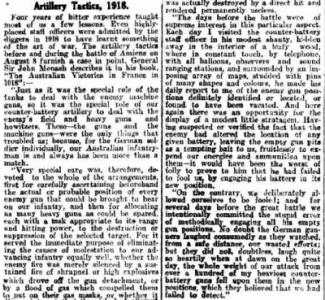Western Mail, Thursday 23 November 1933, page 2
Artillery Tactics, 1918.
Four years of bitter experience taught most of us a few lessons. Even highly placed staff officers were admitted by the diggers in 1918 to have learnt something of the art of war. The artillery tactics before and during the battle of Amiens on August 8 furnish a case in point. General Sir John Monash describes it in his book, "The Australian Victories in France in 1918":-
"Just as it was the special role of the, tanks to deal with the enemy machine, guns, so it was the special role of our counter-battery artillery to deal with the enemy's field and heavy guns and howitzers. These - the guns and the machine guns-were the only things that troubled us; because, for the German soldier individually, our Australian infantryman is and always has been more than a match.
"Very special care was, therefore, devoted to the whole of the arrangements, first for carefully ascertaining beforehand the actual or probable position of every enemy gun that could be brought to bear on our infantry, and then for allocating as many heavy guns, as could be spared, each with a task appropriate to its range and hitting power, to the destruction or suppression of the selected target. For it served the immediate purpose of eliminating the causes of molestation to our advancing infantry equally well, whether the enemy fire was merely silenced by a sustained fire of shrapnel or high explosives which drove off the gun detachment, or by a flood of gas which compelled them to put on their gas masks, or whether it was actually destroyed by a direct hit and rendered permanently useless.
"The days before the battle were of supreme interest in this particular aspect. Each day I visited the counter-battery staff officer in his modest shanty, hidden away in the interior of a leafy wood, where in constant touch, by telephone, with all balloons, observers and sound ranging stations, and surrounded by an imposing array of maps, studded with pins of many shapes and colours, he made his daily report to me of the enemy gun positions definitely identified or located, or found, to have been vacated. And here again there was an opportunity for the display of a modest little stratagem. Having suspected or verified the fact that the enemy had altered the location of any given battery, leaving the empty gun pits as a tempting bait to us, fruitlessly to expend our energies and ammunition upon them-it would have been the worst of folly to prove to him that he had failed to fool us by engaging his battery in its new position.
"On the contrary, we deliberately allowed ourselves to be fooled; and for several days before the great battle we intentionally committed the stupid error of methodically engaging all his empty gun positions. No doubt the German gunners laughed consumedly as they watched, from a safe distance, our wasted efforts; but they did not, doubtless, laugh quite so heartily when at dawn on the great day, the whole weight .of our attack from over a hundred of my heaviest counter battery guns fell upon them in the new positions, which they believed that we had failed to detect."







